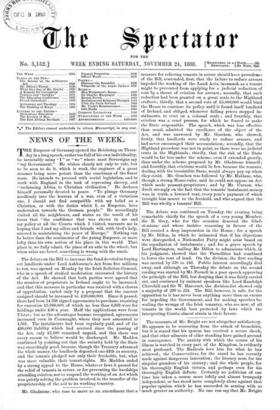Mr. Gladstone, who rose to move as an amendment that
a
measure for relieving tenants in arrear should have precedence of the Bill, contended, first, that the failure to reduce arrears impeded the working of the Land Acts, inasmuch as a tenant might be prevented from applying for a judicial reduction of rent by a threat of eviction for arrears ; secondly, that such reduction had been granted on a great scale to the Highland crofters ; thirdly, that a second vote of £5,000,000 would bind the House to continue its policy until it found itself landlord of Ireland, and obliged, whenever falling prices stopped in- stalments, to evict on a colossal scale ; and fourthly, that eviction was a cruel process, for which he feared to make the State responsible. The speech, which was less effective than usual, admitted the excellence of the object of the Act, and was answered by Mr. Goschen, who showed, firstly, that landlords were ready to reduce arrears, and had never encouraged their accumulation ; secondly, that the Highland precedent was not in point, as there were no judicial rents in the Highlands ; thirdly, that the risk of the State would be far less under the scheme, even if extended greatly, than under the scheme proposed by Mr. Gladstone himself ; and fourthly, that evictions would be few, because the tenants, dealing with the irresistible State, would always pay up when they could. Mr. Goschen was followed by Mr. Haldane, who, though a strong Home-ruler, said he could not oppose an Act which made peasant-proprietors ; and by Mr. Curzon, who dwelt strongly on the fact that the tenants' instalment-money was, in truth, a lowered rent, every year's payment of which brought him nearer to the freehold, and who argued that the Bill was wholly a tenants' Bill.






































